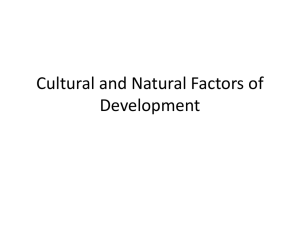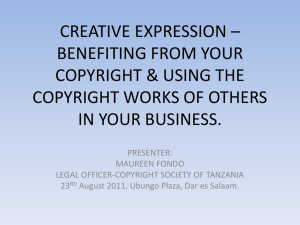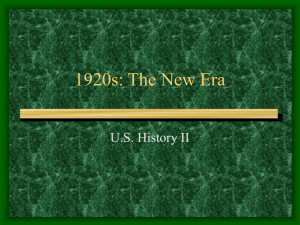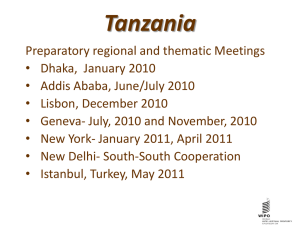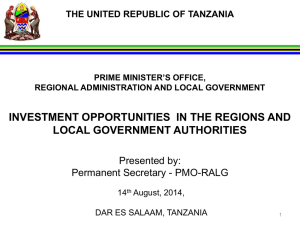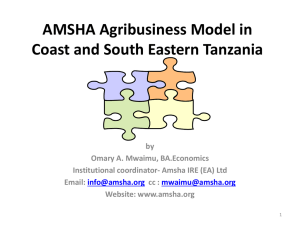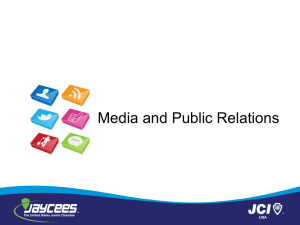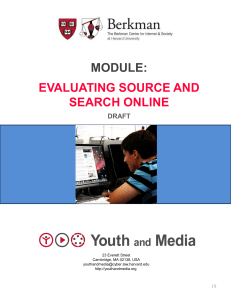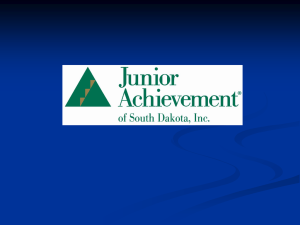Tanzania
advertisement
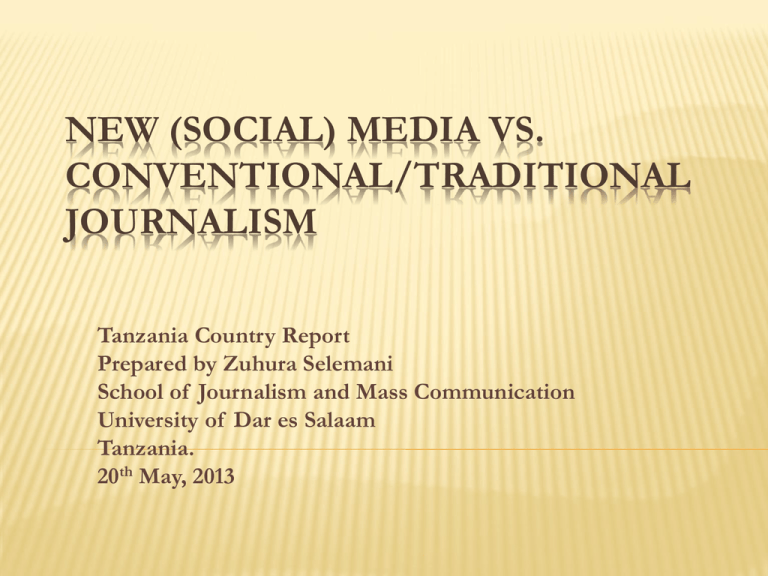
NEW (SOCIAL) MEDIA VS. CONVENTIONAL/TRADITIONAL JOURNALISM Tanzania Country Report Prepared by Zuhura Selemani School of Journalism and Mass Communication University of Dar es Salaam Tanzania. 20th May, 2013 THE MAJOR (OR THE MOST POPULAR) NEWS MEDIA IN TANZANIA Tanzania has one of the most vibrant media landscapes in the region, with over 18 daily newspapers, 63 weeklies, 60 radio stations and 15 television stations as well as virtually unrestricted Internet accessibility Up to 2010, Television was accessed by only 5% of the population, while about 15 million Tanzanians own radio sets; the Internet catered for only 1% of the country’s estimated 40 million people (MCT, 2010) POPULAR NEWS MEDIA CONT… Radio listening remains by far the most popular home based media. The print media: mixture of private owned, (which are the majority), and a government owned newspaper namely the "Daily News" run by the Tanzania Standard Newspapers (TSN) *The media in Tanzania is trying to satisfy a very demanding audience. POPULAR NEWS MEDIA CONT… The English newspapers are the Daily News, Guardian, and The Citizen, while Kiswahili ones include Mwananchi, Majira, and Tanzania Daima. –there are national Those newspapers are popular and enjoy mass readership (MCT, 2010, p.51). THE MAJOR CHALLENGES REGARDING THE NEWS MEDIA 1. Laws Article 18 of the constitution of the URT provides that freedom of expression and opinion-to seek, receive, impart or disseminate, and every citizen has the right to be informed at all times of various events in the country and in the world at large. CHALLENGES CONT… The Newspaper Act 1976 (Act No.3/1976) The President has the power to prohibit any publication to be imported or printed if he/she finds that it jeopardizes national interest. The minister for information has the power to prohibit publication of a newspaper and that it will be an offence if any person sells, prints, distributes after such prohibition. The Broadcasting Service Act. (Act.No. 6/1993) The act establishes several functions. The commission under section 6(1) issues broadcasting licenses, regulates and supervises broadcasting activities. The commission is responsible for standardization, planning and management of the frequency spectrum. CHALLENGES CONT… 2. Infrastructure: to transport newspapers to peripheral rural areas is, however, prohibitive. 3. Limited circulation of newspapers, the low purchasing power of most citizens, the high cost of batteries for radio sets and the shortage of electricity provision to rural dwellers, and the high costs of owning television sets. CHALLENGES CONT… 4. Accessing Internet remained as main challenges-technicalknow how and ownership. 5. On the gender front, women have limited access to radio in rural areas as men move around with their portable radio sets. 6. Threats and killing-over FOE -certain number of journalist were killed duringfield work! -Some tortured, receiving threats and serious harm -State and Police interference-use of force, police detention (Ndimara, 2012). INTERNET PENETRATION IN TANZANIA Internet was introduced in 1996 causing big impact on information and communication sectors. By May 2010, there were 67 entities registered as internet service providers, data operators and international data carriers. *All mobile phones networks also provide internet service through mobile phones (to more than 20 million subscribers) NEW GENERATION TELEPHONE GADGETS ARE SURELY MAKING THE WORLD GLOBAL VILLAGE BY FACILITATING DATA AND TEXT COMMUNICATION FAST, AND MORE EFFICIENTLY FOR THE MEDIA INDUSTRY (MCT, 2010,P.VIII) PENETRATION CONT… In 2003, the Ministry of Communications and Transport adopted the National Information and Communication Technology (ICT) policy with the mission to enhance nationwide economic growth and social progress. “Compared to countries in developed world where the alternative media have been around for several decades now, the development is relatively new in Tanzania” (MCT, 2010, p.50). Most rural areas are not even connected to the national grid, thus putting the majority of rural dwellers at a disadvantage in accessing Internet facilities, as noted earlier EMERGING NEW MEDIA The Internet: 1. Social Networks: Facebook, Twitter, Blogs 2. Email 3. Mobile phone txt Issa Michuzi (issamichuzi.blogspot.com) Ndesanjo Macha (jikomboe.com) Jamii Forums (jamiiforums.com) Maggid Mjengwa (mjengwa.blogspot.com) Note: media convergence: Conversional media are now days found in new media NEW MEDIA CONT…. Studies have shown that facebook and blogs are increasingly used as alternative media (Njonjo, 2012, p.43) Twitter is also increasing challenging the traditional media (p.23) Issa Michuzi, an experienced photo-journalist, is leading. With an average of 1.3 million visitors a day from 167 countries, the blog in fact enjoys an International reputation, and is among the top ten leading blogs in Africa. JOURNALISTS' WORK CONDITIONS Political influences Owners monopolization Most are volunteers/independent reporters Freelancers-no permanent employment Threats, torture and death USE OF MOBILE PHONES AND OTHER MOBILE DEVICES Communication: text messages are now a popular form of communication during big events like elections. Internet Mobile Banking-(Mpesa, EzyPesa, Tigo Pesa, Airtel Money). Other Corporate banks cooperate with mobile phone companies for withdraw, checking balance SHARE OF MEDIA CONSUMPTION (TIME USAGE BETWEEN NEWSPAPERS, RADIO, TV AND ONLINE) Online: Blogs, Social networks-young generation, working class Recent introduction of digital TV broadcasting has decreased number of viewers. Radio-(mostly in rural areas) a replacement of TV Newspaper disseminate the same content as TV&Radio, but on the following day-no instant reporting-audience prefer more of electronic(MCT,2011) SHARE OF ADVERTISING MARKET (BETWEEN NEWSPAPERS, RADIO, TV AND ONLINE) The income of most newspapers and periodicals derives mainly from sales to readers and advertising. In Tanzania print media is the largest advertising medium. Content on the blog also include news, announcements, commentaries and advertisements! “One thing, which is clear and is admitted by media owners and managers, is that media houses, especially those publishing newspapers, are currently experiencing serious liquidity problems. The question is whether the situation is engendered by declining advertising income associated with online advertising competition or not” (MCT, 2011,p.89). SHARE OF ADVERTISING MARKET CONT… “Muhidin Issa Michuzi, the pioneer of the most popular blog in Tanzania, The Michuzi Blog, acknowledges that mobile phone companies are today advertising on his blog. This is an indication that as popular individual blogs and social forums evolve, they are likely to take a share of the advertising revenue currently earned by traditional media” (MCT,2011,p.90). SHARE OF ADVERTISING MARKET CONT… Yet others argued that its not the time yet. It is not possible for most advertisers in Tanzania to abandon radio, television and newspaper advertising in favor of new outlets when there is no solid market data to convince them that the new media will yield expected business impact on the local market scene. More time is needed to unfold. Collapse of most TV-digital broadcasting in relation to advertisements! CONCLUSION The government of URT respects the freedom of the press, but it does not entertain the "Free Freedom". There is a Press Freedom with obligations such as imposed different acts to regulate the news media (as mentioned earlier) New media is growing although it is different to countries in developed world where the alternative media have been around for several decades now, the development is relatively new in Tanzania
